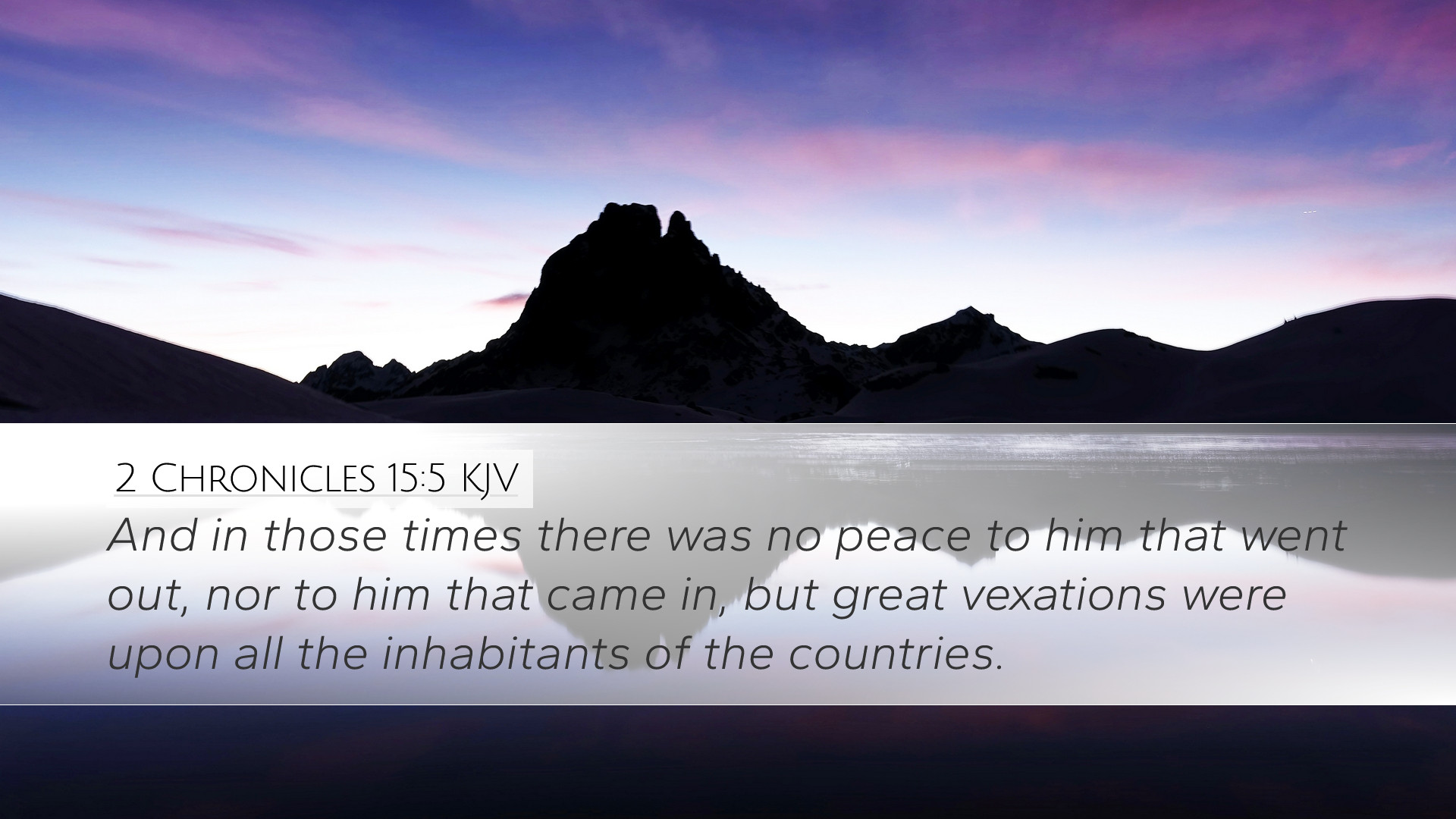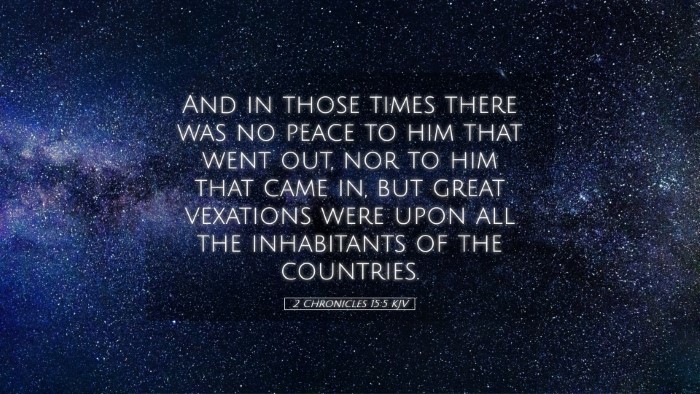Commentary on 2 Chronicles 15:5
The verse 2 Chronicles 15:5 highlights a critical moment in the history of Judah during the reign of King Asa. The context of this scripture is essential for understanding the depth of its significance. Let us delve into the insights provided by notable public domain commentaries by Matthew Henry, Albert Barnes, and Adam Clarke.
Contextual Overview
This verse appears during a time of spiritual reform led by King Asa. After turning away from idol worship and seeking to restore the worship of Yahweh, Asa received a strong prophetic encouragement from Azariah the son of Oded. The broader narrative reflects the struggle between faithfulness to God and the pressures of surrounding pagan cultures.
Verse Text
“And in those times there was no peace to him that went out, nor to him that came in, but great vexations were upon all the inhabitants of the countries.”
Insights from Matthew Henry
Matthew Henry emphasizes that during these tumultuous times, Asa’s reliance on God was paramount. He points out that the lack of peace in society was a direct consequence of the people's disobedience and idolatry. Henry elaborates on how God can withdraw His peace from a nation when it turns away from the paths of righteousness.
- Spiritual Implications: Henry asserts that peace is not merely the absence of conflict but is imbued with a divine presence. He reflects on the tangible effects of spiritual fidelity or infidelity.
- Societal Reflection: The turmoil faced by the inhabitants serves as a reminder that the health of a society is often linked to its spiritual condition before God.
- God’s Sovereignty: Henry notes how God uses external pressure to draw His people back to Him, illustrating a theme of divine discipline leading to restoration.
Insights from Albert Barnes
Albert Barnes, in his commentary, delves into the socio-political fabric of Judah during this era. His observations reinforce the idea that the absence of peace mentioned in the verse reflects broader national and international distress.
- Historical Context: Barnes highlights the geopolitical tensions that often arise in biblical narratives and how these serve as a backdrop for spiritual crises.
- Call to Righteousness: He connects the unrest to a need for national repentance. Barnes encourages readers to understand that individual and corporate sin affects God’s favor.
- Divine Intervention: Barnes points out that periods of distress can be opportunities for divine deliverance when a people humbly turn back to God.
Insights from Adam Clarke
Adam Clarke broadens the theological discussion by integrating insights into the state of the world and the church. He highlights the author's intention in recording these events as a historical lesson.
- Lessons on Faithfulness: Clarke emphasizes the need for continual faithfulness to God amidst societal pressures. He draws parallels between the then and now, stressing the individual believer's role.
- Interdependence of Peace and Righteousness: Clarke articulates that just as Judah faced great vexation for their disobedience, today’s believers must recognize the importance of maintaining a righteous standard in order to experience God’s peace.
- Hope for Restoration: Clarke’s reflections remind readers that God is always waiting to restore those who turn back to Him with sincere hearts.
Theological Principles Drawn from 2 Chronicles 15:5
As we synthesize insights from these respected commentators, several theological principles emerge that can serve as guiding reflections for pastors, students, theologians, and scholars.
- God’s Desire for Relationship: The chaos and lack of peace serve to illustrate God's desire for a genuine relationship with His people, which should compel believers to pursue Him fervently.
- Sin's Consequences: The verse underscores the devastating impact of sin on both the individual and the community, reinforcing the necessity of confession and repentance.
- Corporate Responsibility: The national implications of personal faith highlight that communities must collectively seek God to restore peace and righteousness.
- Hope Through Adversity: Historical examples remind readers of the transformative power of adversity when met with faith and reliance on God.
Conclusion
Ultimately, 2 Chronicles 15:5 serves as a poignant reminder of the intertwined relationship between societal health and spiritual fidelity. Through the reflections of Henry, Barnes, and Clarke, we see that scripture not only conveys historical truths but also offers timeless wisdom relevant for today’s church. The call to remember God's sovereignty and the personal responsibility of each believer remains ever pertinent.


